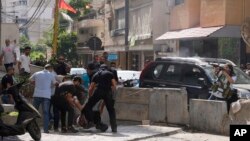At least five people were killed and 16 wounded as shots were fired during a protest by Iran-backed Hezbollah supporters against Tarek Bitar, the judge investigating the 2020 Beirut Port blast. Explosions were also heard Thursday as tensions over the politically charged case push Lebanon into another crisis. The Lebanese army is searching for the gunmen.
Interior Minister Bassam Mawlawi pointed to a worrying development, saying many of the casualties from the eruption of gunfire in Beirut were by snipers from the buildings. “This is a very dangerous sign,” Mawlawi told reporters. “No one can take this.”
Joseph Bahout, who directs the Issam Fares Institute at the American University of Beirut and lives near the scene of the shootings, told VOA that the bursts of gunfire and the wail of ambulance sirens made him feel like he was reliving scenes from Lebanon’s civil war of 1975 to1990.
“Today, it’s probably a very explosive situation. The country is now on the verge of maybe something very grave if really what we hear so far is confirmed — that there are snipers on the rooftops shooting at both parties protesting in the streets. This could really resemble the start of ’75 in Lebanon," Bahout said.
At a nearby school, teachers instructed children to lie face down on the ground with their hands on their heads, a witness told Reuters.
Bahout warned that the violence, which broke out in an area dividing Christian and Shiite Muslim neighborhoods — a former front line of the 1975-90 civil war — could sideline the probe into last year’s catastrophic Beirut port blast that left more than 200 dead and destroyed vast parts of the capital.
“We are on the very slippery terrain and my fear is that the issue of the port inquiry will become soon one of many other crises in the country. This question will become very concealed and secondary compared to what is happening this morning in the streets: the clashes, the firing, the sniping. Increasing the debate will shift to what happened this morning. Who started the shooting? Who shot whom? I fear the issue of the port will soon be in a way submerged and maybe put aside,” Bahout said.
Judge Bitar has faced enormous pressure from former ministers linked to Hezbollah, Lebanon’s powerbroker, and from its leader, Hassan Nasrallah, who accuse him of singling out their political allies for questioning in the probe. They have been trying to stop his investigation into the August 4, 2020, Beirut port blast, one of the biggest non-nuclear explosions in history. Reports said a huge quantity of ammonium nitrate — commonly used to make fertilizer or bombs — was left unsafely stored there for years.
Families of the port blast victims have warned against replacing or intimidating Bitar, “no matter how high the threat level,” telling officials to “keep [their] hands off the judiciary.”
Analyst Bahout says Prime Minister Najib Mikati's new government now faces a fresh sectarian challenge on top of trying to rescue the country from economic collapse and an energy crisis.
Some political leaders say that an international investigation into the blast may be needed because Hezbollah is threatened by a probe pointing at it.





